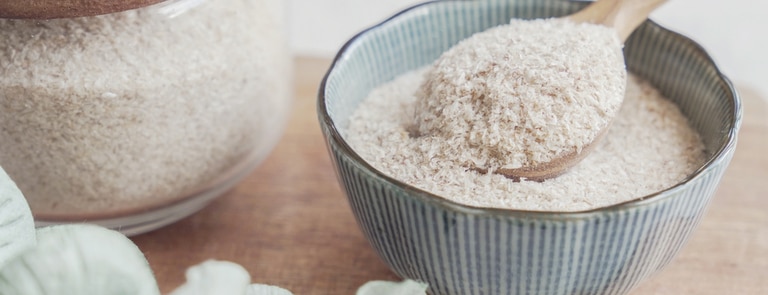10% off £35
Code:SAVE
What is psyllium husk and what are its benefits?

Psyllium husk is a source of fibre. It’s best known for its potential to improve constipation. But why else should you be using psyllium husk?
Summary
1What is psyllium?
Psyllium comes from a shrub-like herb called Plantago psyllium, which grows predominantly in India. The husk is the outer coating of the psyllium seed
2What is psyllium husk used for?
Psyllium husk is a rich source of fibre. And if there’s one thing roughage is known for, it’s the ability to get things moving in the poop department.
3Psyllium husk for constipation – how does it work
The molecular structure of fibrous plants, such as psyllium husk, makes them more difficult than other carbohydrates to break down and use as energy.
Psyllium husk is a naturally occurring, plant-derived source of fibre. It’s best known for its potential to improve constipation. But are there any other good wellness reasons for using psyllium husk? Here, we explore the science behind this seed, as well as the potential benefits and side effects.
What is psyllium?
Psyllium comes from a shrub-like herb called Plantago psyllium, which grows most predominantly in India. The husk is the outer coating of the psyllium seed. It’s a rich source of fibre, making it beneficial for gut health as well as some other wellness purposes. The main sources of psyllium are:
- As a dietary supplement. Some people mix whole husks in liquid. Others prefer a psyllium powder. Granules and capsules are also available.
- As an ingredient in fibre and constipation supplements. For example, many branded laxatives use it as an active ingredient.
- In food. You sometimes find it in fortified products such as breads and cereals.
Summary
- Psyllium husk is a plant-derived source of fibre
- Find it in certain foods, as a dietary supplement, or as an active ingredient in laxatives
- It’s also known as ispaghula or isabgol husk
What is psyllium husk used for?
Psyllium husk is a rich source of fibre. And if there’s one thing roughage is known for, it’s the ability to get things moving in the poop department. As a result, people often come across psyllium husk when looking for a laxative to provide relief from constipation.
As a bulk-forming laxative, its primary purpose is to support your bowels by enabling stools to move through your digestive system with ease.
Summary
- Psyllium husk is a common fibre supplement
- An important use is encouraging and regulating bowel movements
- Many people use psyllium husk for constipation
Psyllium husk for constipation – how does it work?
The molecular structure of fibrous plants, such as psyllium husk, makes them more difficult than other carbohydrates to break down and use as energy. As a result, fibre mainly passes through your digestive system without breaking down or being digested.
But how exactly does psyllium help? As a bulk-forming laxative, psyllium works by helping your bowels retain more water. By binding to food, more liquid is absorbed in the intestines. This helps your body to form a heavier, softer stool that’s easier for you to pass.1
Summary
- As a fibre, psyllium passes through your digestive system without breaking down
- This characteristic makes it a popular active ingredient in bulk-forming laxatives
- This means it helps relieve constipation by forming bulkier, softer stools that are easier to pass
How long does psyllium husk take to work?
It can take two to three days to see improvements in bowel activity.2 However, some people prefer this more gradual laxative action because it initiates a steadier improvement in constipation symptoms than stimulant laxatives. A general rule is to try bulk-forming laxatives, such those containing psyllium, before using other stimulant and osmotic laxatives.3
Summary
- The effects on bowel movements are more gradual than some other forms of laxatives
- Many people find their bodies tolerate this form of laxative easier
- It’s often the recommended starting point for people looking for relief from constipation
A few tips to help it work better
If you’re using psyllium husk for constipation, there are a few things that can help make it more effective.
- Stay well hydrated To enhance its stool softening capability, drink plenty of water. As a general rule, adults should try to drink about eight glasses of fluid per day. Preferably, half of this volume should be water.4
- Eat more fibre too Support the action of psyllium by also eating varied sources of fibre in your daily meals. For example, fruit and vegetables, wholemeal and wholegrain breads and cereals, brown rice, and wholemeal pasta.
- Stay active Getting your body moving can help to keep your digestive system moving too. Try building some form of activity into your daily routine.
Summary
- It can take two to three days to experience the benefits on bowel activity
- However, there are supplementary actions you can take to support and encourage the effectiveness for constipation
- Drinking plenty of water, eating fibrous foods and committing to daily activity will support the action of a fibre supplement
Other psyllium husk benefits
- Psyllium husk for diarrhoea
There’s evidence that psyllium's water-absorbing capabilities could also increase stool thickness. This helps normalise bowel movements and reduce the severity of diarrhoea.5 - Lowering cholesterol
Psyllium is a gel-forming fibre that binds to fat and bile acids. This helps your body excrete these substances. When the liver starts the process of replacing these bile acids, it has to use cholesterol instead to make more. As a result, the levels of cholesterol in the blood can reduce.6
- Regulates blood sugar levels
Taking water soluble fibre supplements, such as psyllium husk, can change your body’s glycemic response to a meal.7 For example, studies show signs it can reduce insulin and blood sugar levels.8Summary
- Relieving constipation is not the only use
- Despite being a laxative, it can also be surprisingly effective in managing diarrhoea
- Lowering cholesterol and managing blood sugar levels are additional benefits
Is it safe to take psyllium every day?
The right psyllium husk dose for you depends on what you’re taking it for and the exact product. However, as an example, an adult taking psyllium husk for constipation may take it once, twice or three times a day.9
But note, any laxative supplement is generally only recommended for short term use. Instead, eating a healthy diet including various sources of fibre is a better longer term way to prevent recurrent constipation.
Why psyllium husk is bad for you?
Psyllium works on constipation by triggering laxative effects and creating intestinal bulk. Although in time this can have a favourable effect on regulating bowel movements, it can also cause some initial unwanted side effects. For example, excess wind, bloating and abdominal discomfort. These symptoms should settle as your body adapts to receiving the extra fibre.10
Is psyllium husk good for weight loss?
Studies suggest taking psyllium at mealtimes can encourage feelings of fullness and reduce hunger between meals.11 However, research into the impact of psyllium on weight management is currently inconsistent. More studies will hopefully unravel the connection (if any) with weight loss.
Summary
- Psyllium-based laxatives can be taken daily to relieve constipation
- Long term daily usage is not recommended
- Any initial side effects should reduce as your body adapts
- Taking psyllium could help to reduce hunger
Conclusion: What are the benefits of using psyllium husk?
As a rich source of fibre, psyllium husk is most popularly used to improve constipation. However, it can offer other potential health benefits too. These include lowering cholesterol and regulating blood sugar and insulin.
- https://www.ncbi.nlm.nih.gov/pmc/articles/PMC5413815/
- https://www.nhs.uk/conditions/laxatives/
- https://www.nhs.uk/conditions/laxatives/
- https://patient.info/medicine/ispaghula-husk-for-constipation-fybogel-ispagel-2
- https://www.ncbi.nlm.nih.gov/pmc/articles/PMC5413815/
- https://www.ncbi.nlm.nih.gov/pmc/articles/PMC5413815/
- https://onlinelibrary.wiley.com/doi/abs/10.1002/ptr.6609
- https://www.sciencedirect.com/science/article/abs/pii/S0378874105003983?via%3Dihub
- https://www.drugs.com/dosage/psyllium.html#Usual_Adult_Dose_for_Constipation
- https://patient.info/medicine/psyllium-husk-for-constipation-equate-konsyl-metamucil-reguloid
- https://www.sciencedirect.com/science/article/pii/S0195666316301738?via%3Dihub
Related Articles
Shop by wellness goal
Sign up for exclusive offers
Plus, get expert advice to support your health & wellness straight to your inbox when you sign up to Holland & Barrett emails.
Read our
privacy policy














